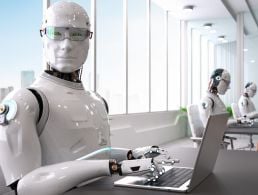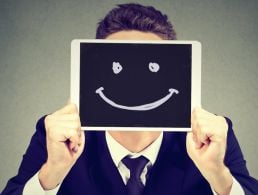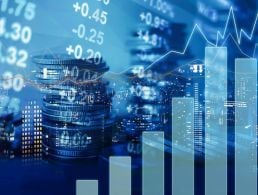Avanade Ireland’s Alex Ferreira explains why modern workplaces should focus on ‘hyper-personalised experiences’ and empathetic leadership.
Many of us wonder what future workplaces will look like, from offices of the future to the role of co-working spaces.
Someone with unique insights is Alex Ferreira, who leads Avanade Ireland’s modern workplace business. Ferreira believes that one of the most important aspects of the future of work will be a stronger need to feel connected to an organisation. Employees are starting to place more importance on “playing a part in something that transcends their own contributions”, he says, and belonging and trust are vital to this.
“Intrinsically connected to this is people seeking a feeling of belonging and trust that they can be their whole self at work, as part of a diverse and inclusive environment,” he says. “Not only is this the right thing to do, it’s also the smart one; it has been proven consistently that diverse teams deliver better results.”
Being able to bring your whole self to work is a critical component of a healthy work-life balance, which has been getting more attention since the pandemic began and many teams were told to work from home. “In the future, and considering what the last few months have taught us is possible, people will expect more flexibility of where they work from,” Ferreira adds.
Technologies such as augmented reality (AR) and artificial intelligence (AI) are going to be involved in making this possible in the long term. Ferreira sees the use of “everyday AI” spreading, which will “make our tasks and decision-making processes easier and more informed”.
“While human-level intelligence may still be a way off, what will soon become a reality in our workplaces are increased levels of automation that eliminate routine work and allow us to focus on more creative and interpretative work that humans are better suited than machines to perform,” he adds.
How will workplaces of the future operate?
One big change we can expect from workplaces of the future, according to Ferreira, is a greater focus on experience. Modern organisations, will give their employees “hyper-personalised” experiences based on their “role, preferences, activities and colleagues”.
They will leverage AI and AR to “augment their workplace experience to levels beyond what we could imagine even a few years ago”, he explains.
“I also believe robotic automation will become commonplace, although very likely not in the negative light some picture it today. Instead, teams will evolve over time to incorporate AI and robotic assistance in their day-to-day workloads to achieve more.”
‘If there is a silver lining with the pandemic, it’s that it has shown us how much organisations can achieve in such a short period of time’
– ALEX FERREIRA
Alongside AR and AI, more cloud-based operations will allow businesses to cultivate “richer partner ecosystems and services”. Ultimately, Ferreira says, this will free up technical employees to focus on “higher-value and possibly even revenue-generating tasks”.
“Finally, for the organisation, a modern workplace will be seen as a key source of value, and not just a cost centre,” he says. “The correlation between employee experience and profitability, innovation and customer satisfaction will only grow clearer.”
What should companies do?
In light of these trends, Ferreria says that organisations need to establish “efficient and coherent physical and digital employee hubs”.
“This is the right time to invest in your employee experience and ensuring staff can be productive, communicate and collaborate in a smooth and consistent way, wherever they are, and across all of your workforce,” he says.
An example he gives is frontline workers, many of whom have been “left out” of digital transformation processes. But this can be changed. “There are many productivity and efficiency gains to be realised, and lines between knowledge [workers] and frontline workers are increasingly blurred.
“We’ve seen great successes bringing tools such as Microsoft Teams to the front line, as it includes a suite of applications specifically tailored to support their needs.”
What should individuals do?
Although we are part of something bigger – whether it’s a company or team – we shouldn’t forget to consider the role we’ll each play in the future of work, and how we can individually prepare.
Ferreira believes that “the job we are hired to do today will either disappear or be transformed into a different job tomorrow” and we need to be ready for this “fundamental shift”. Demand will deepen for ‘learn-it-alls’ instead of ‘know-it-alls’, and so Ferreira advises that “your best investment is becoming proficient at learning”.
“Identify your transferable skills and start realising what future roles and industries could match your specific qualities and strengths, and what else you could be doing to prepare your future. There is huge demand for people that understand technology and the businesses, as technology continues to reshape industries. Individuals who are passionate about solving problems in creative ways will continue to be sought after.”
Which other skills will be in high demand? According to Ferreira, empathy will be a key one for leaders, as will “behaving in a principled way”. The latter is something he has always seen as “the key to success”, but he believes it will become more important now in this changing era of work.
“How leaders conduct themselves matters more now than ever, and they’ll need to lead by example and not shy away from making difficult decisions,” he says. “Not setting and exhibiting the right ethical standards within the organisation can have a devastating effect, as concerns such as privacy remain key business drivers.
“It is expected leaders will continue their efforts to eliminate discriminatory biases within the workplace, as society and external stakeholders pile up the pressure on organisations that do not correct course. And as the pandemic has shown us, leaders need to be flexible and dynamic to adapt to new circumstances.”
How to lead future workplaces
Finally, Ferreira says that leaders will need to become more proficient with technologies that help them “make data-driven decisions, analyse real-time data and dashboards and use self-service analytics tools”. Getting to grips in these tech-focused areas will allow leaders to “unlock new insights and answer new questions”.
“A leader that is able to seamlessly integrate AI into the team workflow will be able to reap its benefits,” he adds. “A great example of this is Microsoft’s Workplace Analytics platform that enables leaders to understand their team’s working patterns, levels of engagement and efficiency.
“My last recommendation to leaders would be to keep an eye on robotic process automation as a way to improve their team’s efficiency, and look at their own personal workflow as a leader and consider automating their own repetitive tasks using tools such as Power Automate in Office 365.
“It’s okay to be a little bit nervous. But if there is a silver lining with the pandemic, it’s that it has shown us how much organisations can achieve in such a short period of time. We’ve all had to adapt pretty much overnight, in very difficult and uncertain circumstances, and most organisations have done pretty well.
“I would challenge organisations to continue pushing in this direction as it will make them more prepared for whatever the future of work brings.”




